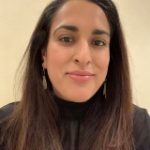Wednesday 24th February 2021 saw a gathering of over three hundred people at the UK Data Service’s online event #DataImpact2021 – #IdentityInData: Who counts? Visibility, voice and culture in data collection and use.

 Introduction
Introduction
Chaired by Gillian Prior, Director of Survey Research at NatCen Social Research the event focused on how researchers are increasingly exploring how discourses of self and identity and data remain inclusive from the perspectives of those populations, communities and individuals. Data collection methodologies are also developing. These methodologies are increasingly becoming perceived as significant and impactful research assets in their own right. The event focused on how these developments are in themselves a critical element of the social construction of statistics. They reflect, sometimes imperfectly, the lived experience of data subjects.
Our keynote speaker, Lemn Sissay MBE, poet, author, broadcaster and Chancellor of the University of the Manchester (one of the partners in the UK Data Service) brought a personal perspective to #DataImpact2021 of his own experiences of being (as he described it) “data wiped” and the impact this had on his life. Lemn spoke powerfully about his battle to rediscover his past.
#DataImpact2021: #IdentityInData: Who counts? Visibility, voice and culture. @lemnsissay introduction was the most inspiring and generous talk about data and visibility I attended in the past 10 years at least. pic.twitter.com/A2McVQbXgy
— Dr Anna Troisi (@anna_troisi) February 25, 2021
Panel presentations
 Dr Dharmi Kapadia
Dr Dharmi Kapadia
Dr Dharmi Kapadia, lecturer at the University of Manchester, a member of the ESRC Centre on Dynamics of Ethnicity (CoDE) and one of the UK Data Service’s original cohort of #DataImpactFellows talked about the idea of being ‘so visible, yet invisible’ in relation to ethnic minorities in data:
Many ethnic minority people are visibly minorities but often their experiences to a large extent are not sufficiently acknowledged and sometimes are completely erased from our data sources.
Dharmi’s research focuses on inequalities, particularly in health, faced by older ethnic minority people.
Dharmi introduced the Evidence for Equality National Survey, or EVENS, funded by the Economic and Social Research Council and designed by CoDE. The survey aims to recruit 17.000 people from ethnic minorities.
The survey’s innovative approach rests not only its sampling design, but also in how it collects ethnicity in a number of ways, including providing a free-text option for people to self-define their ethnicity.
For the first time in a national survey, it will differentiate black African people of sub-Saharan descent and those who are not.
It is also the first time that Roma and gypsy traveller communities will be meaningfully represented in such a large national survey. Data from EVENS will be made available through the UK Data Service.
Read Dharmi’s blog post Represented yet excluded: How ethnic minority people are counted in national surveys, as well as other posts she has written for the Data Impact blog.
 Dr Daniel Staestky
Dr Daniel Staestky
Dr Daniel Staetsky, Senior Research Fellow at Jewish Policy Research (JPR) and Director of its European Jewish Demography Unit introduced what he terms the ‘rarity problem’. He explained that Jews are less than half of one per percent of the UK population with implications as to how they captured in surveys, if at all:
Being a minority, you need to be identified in the sources. And not only we want to be identified, but correctly identified. And not only that we need to be counted.
Daniel noted that it can be difficult to ensure, between the rarity problem and being correctly identified and counted, that smaller minorities, such as Jewish communities, are counted.
JPR campaigns to improve this aspect of data collection. Daniel added that while the census identifies Jews, much administrative data, including registrations of birth, marriages and deaths, and NHS records, don’t.
Daniel pointed out that it can take years’ worth of surveys to create a sufficiently robust number of Jews in their data. He concluded by noting that special methods are needed, beyond just inclusion in survey questions, to ensure very small minority groups are adequately represented in the data.
 Dr Kevin Guyan
Dr Kevin Guyan
Dr Kevin Guyan, is a Researcher for Advance HE, an organisation that focuses on equality, diversity and inclusion among staff and students in UK higher education. He is also engaged in scholarship around the collection, analysis and use of gender, sex and sexuality data, particularly as this relates to LGBTQ individuals in the UK.
Kevin focused on the intersection where data practices and concepts of gender, sex and sexuality meet:
I’m not only interested in what data says about LGBTQ individuals, but I’m really interested in what data, how it relates to power and its expression and use in in terms of representation. I’m interested in how we establish who counts and how this brings some identities into focus while casting other identities further into shadows.
Kevin talked through developments in the UK censuses for 2021/2022 in relation to sexuality and gender identity noting that, while positive changes have been made, people who identify as non-binary are not able to be counted as such in the census.
Kevin invited attendees to consider how we acknowledge that data practices are both productive and sometimes partial, and how decisions made by data producers bring some identities into being while they can leave others behind.
He introduced the term “queer data competence” to inform how decisions about data are made by people who are most affected and concluded by recognising that we can celebrate developments in inclusive data collection, while recognising that data about LGBTQ individuals not only reflects but improves their lives and experiences.
Read Kevin’s blog post: Will more data change the lives of LGBTQ people in the UK?
 Craig Moss
Craig Moss
Craig Moss, Research Manager for Scope, the disability equality charity in England and Wales is responsible for most of the social research conducted by the organisation. He highlighted that one in five people in the UK identify as a disabled person.
Craig discussed how the DDA, and the Equality Act 2010 which superseded it, identify disabled people by the ‘medical model,’ which focuses on their individual conditions or impairments and frames the approach to data collection.
Craig identified the need for meaningful consultations to understand how disabled people experience inequalities and that adopting the social model (which proposes that what makes someone disabled is not their medical condition, but the attitudes and structures of society) could frame disability in terms of supporting representation data.
He introduced Scope’s work on the Disability Price Tag, analysis using the Family Resources Survey which calculated the extra cost of disability for UK households by comparing the standard of living of those households with disabled people against those without.
Our findings were striking, and, on average, the monthly cost of disability was roughly 580 pounds for disabled people and their families.
Craig advocated the value of co-production: moving from the ‘doing for’ approach to the ‘doing with’ one. Scope has recently worked with the co-research collective (a group of young social researchers who are disabled people) from the iHuman institute at the University of Sheffield, exploring social capital of disabled young people.
Scope is planning to establish its own research collective and co-produce research activities, working alongside disabled people as researchers and key informants, to address how to identify how disabled people are expressed through statistics presented on Scope’s website.
 Karen Hurrell
Karen Hurrell
Dr Karen Hurrell is a professional statistician who has worked for the Equality and Human Rights Commission since 2007, and previously for the Equal Opportunities Commission.
Karen introduced the work of the Commission, a statutory non-dependent departmental public body established by the Equality Act 2006, which is also a national equality body and a national human rights institute. As part of its role, the Commission is tasked with reporting to parliament at least every five years on Britain’s progress in equality and human rights, which the Commission does by producing the ‘Is Britain Fairer’ series of reports. The last report was released in 2018 (read our case study giving an overview) and the next is currently in preparation.
Karen introduced the Measurement Framework to assess progress in equality and human rights. The framework uses six domains: education, work, living standards, health, justice, personal security, and participation. Within these domains are a number of supplementary indicators.
Within each domain, there are a set of measures, which include a cross-sectional answer for each year and look at change over time. The Commission assesses progress against the nine protected characteristics, alongside analysis of socio-economic group, people in higher risk categories and geography.
Karen explained that the Commission relies on a great deal of data to pull together its indicators (of the forty-eight measures in the framework, thirty-three use data in the UK Data Service collection). Karen noted that while there is increasing availability of data, there are some areas (she gave the examples of the protected characteristics of disability and sexual orientation) where data is not as easily available.
Read Karen’s blog post: Is Britain Fairer? What do the data tell us?
Panel discussion
Craig and Kevin observed alignment across the panel, identifying the need to be led by people’s experiences.
Dharmi noted that so many marginalised communities are facing hardship exacerbated by the pandemic, and challenges in advocating for people who are suffering without having to push to have them represented in data as well.
Craig noted that processes can be observed as cyclical and self-fulfilling: if people aren’t involved in their representation in data, they may be disinclined to participate in its collection.
Dharmi reported that with the launch of the EVENS survey, the team had been questioned as to why more data was needed. She emphasised that there was a real need to address the issue of how marginalised and disadvantaged communities were.
Gillian put forward some of the delegates’ question to the panel, including from Professor Matthew Woollard, Director of the UK Data Service:
Can we talk about language? For years, survey designers have used language to describe things not in their competence for example white statisticians coming up with terms for ethnicity questions. How do we allow minority opinions to have a voice without being as culturally inappropriate as some language has been in the past?
Dharmi expressed concern with the term BAME (“Black and Minority Ethnic”), She noted that the acronym lumps together many very different and distinct life experiences and the need for specific terminology:
Terminology and the language we use is very important, because it signifies what we think about these groups. It signifies the importance that you’re giving to their experiences.
Daniel noted that statistical systems need to be flexible enough to reflect changes in the understanding of identities which occur all the time and to ensure that minoritised groups are adequately reflected in the data.
How can we start to approach the improvement of data collection to ensure the amplification of diverse voices, if people we want to reach cannot engage for various reasons and we cannot obtain their data? We cannot tell their stories. How can we improve this?
Kevin noted that it is a question of demonstrating that being counted in a data collection exercise is meaningful for their lives. He emphasised that data has to have material beneficial impacts for people in minoritised groups.
Craig pointed out that marginalised groups experience stigma making people less likely to engage with data collection. He added that it can also be liberating to hand over the reins to partners in co-production and give members of marginalised groups the opportunity to contribute to data collection approaches.
Dharmi agreed with Kevin’s point about people feeling excluded from research. She suggested that it doesn’t help when people don’t see signs of anything changing as a result of the data collection. Dharmi felt that it was not a question of encouraging individuals more to take part, rather addressing some of these issues at the level of data collection approach.
What do you think is the key development that would support the continued and evolving representation of self and identity in data?
Craig felt that it is important to embrace the community as experts, empowering communities to conduct research. Not only has it been rewarding for all parties involved, but it has developed trust.
Kevin added that, as interest in work around identity characteristics grows, there needs to be acknowledgement that some people will not want to share data about their identity. As systems and structures develop, that space for not participating – and accepting that – needs to be built in. He noted that there is interesting work being done by data justice campaigns in the US, especially in the area of data on black people.
How do we address the situation where marginalised groups make up such a small proportion of the available data that the data controllers won’t let researchers see the data because it might be disclosive or it’s classed as statistically insignificant? How do we make sure that we involve the groups whilst also protecting their privacy?
Dharmi pointed out that, with census or administrative data, there is not a lot which can be done on a local level, as it would be a statistical disclosure issue, but there may still be useable data at a regional or national level.
She added that the real opportunity comes with national surveys and smaller data collection initiatives, where there are proactive decisions which can be made about design and about oversampling which can help the data be more representative of smaller communities.
Kevin noted that he felt sometimes small numbers are used as an excuse not to do research, whereas often the data, both quantitative and qualitative genuinely does hold enough information to be of use.
How would you see intersectionality in supporting identity in data?
Craig wondered whether there could be a standard approach to capturing data which crosses different groups, acknowledging the difficulty with already harder-to-reach groups.
Daniel added that often major administrative sources of data do not actually include a full set of relevant variables. He noted that, in some situations for example, a question on ethnicity or religion might be optional, when to collect the information could provide a fuller and more informative dataset. He felt there needed to be more consistency in administrative data.
Karen pointed out that, while she hadn’t specifically addressed it in her presentation, her work for the Equality and Human Rights Commission very much focuses on combinations of protected characteristics. She acknowledged that there were limitations in being able to do this, when groups are smaller and the data more difficult to obtain.
Kevin noted that treating the LGBTQ community as a monolithic group brings more privileged members of that community to the fore while obscuring other parts of the community who are often those suffering multiple disadvantages.
Dharmi returned to an issue underpinning the need for the EVENS survey, that ethnic inequalities can only be effectively analysed where adequate information is known not only about ethnicity but about other characteristics which can contribute to inequality. She closed by expressing a desire for statutory organisations to play a larger role in collecting the appropriate level of detail.
In conclusion
Recurring theme of speakers at #DataImpact2021 is value of more granular data e.g. by ethnicity, disability, sexuality. Otherwise risks viewing participants as homogenous groups and not reflecting variety of experiences. #IdentityInData
— Chris Gibson (@ChrisUoMLib) February 24, 2021
#DataImpact2021 was a powerful and thought-provoking event and just the beginning for discussions on #IdentityInData.
We plan to build a vibrant, supportive community going forward. Initial discussions of questions raised and about what a community might look like will take place on our Jiscmail list, which you are welcome to join.
The UK Data Service impact team would like to thank the chair, keynote speaker and panellists for their contributions to #DataImpact2021 and for being so generous in sharing their time and expertise.
Read the Twitter hashtag: #DataImpact2021
